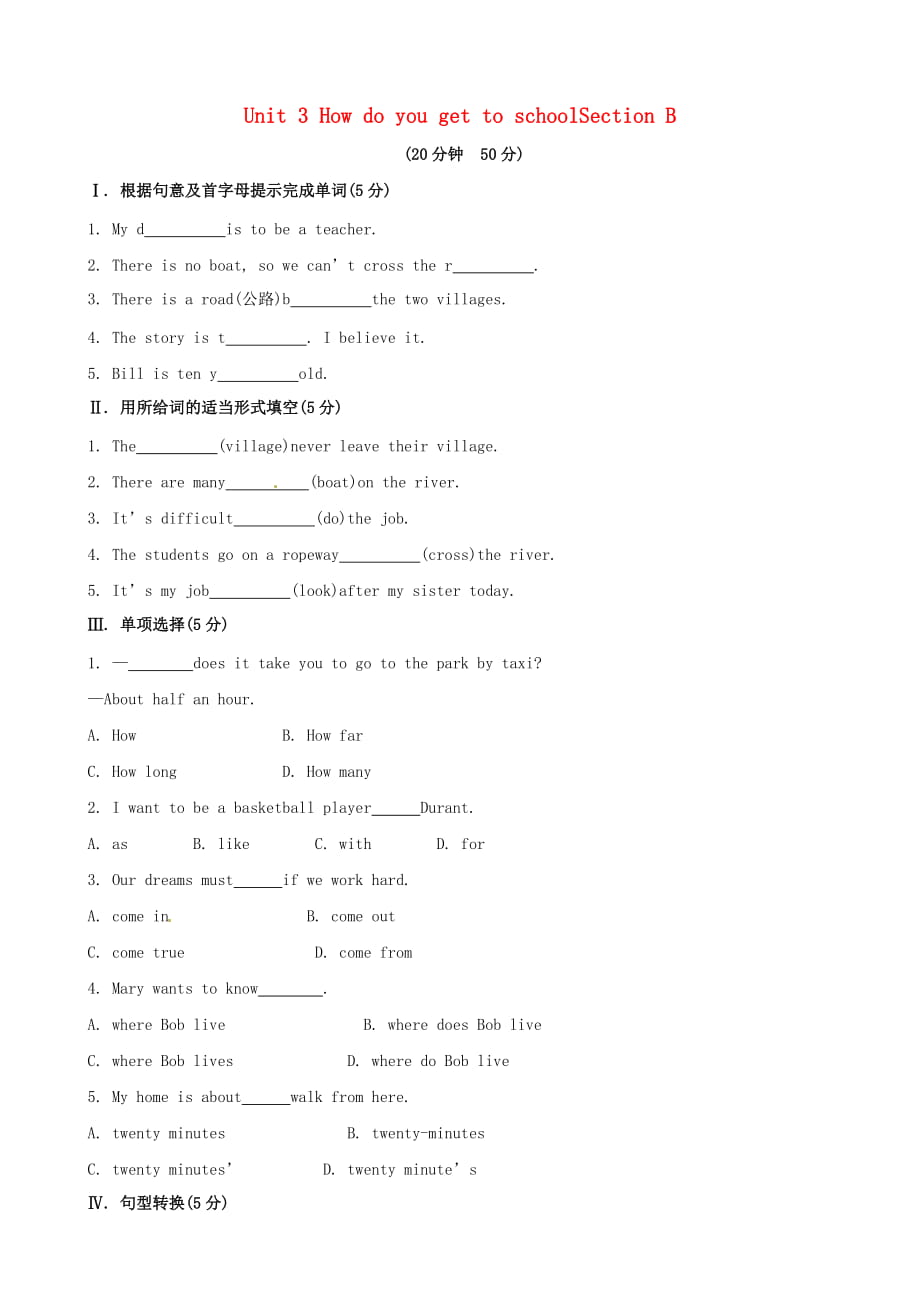《【金榜學(xué)案】七年級英語下冊 Unit 3 How do you get to schoolSection B課時作業(yè) (新版)人教新目標(biāo)版》由會員分享�,可在線閱讀��,更多相關(guān)《【金榜學(xué)案】七年級英語下冊 Unit 3 How do you get to schoolSection B課時作業(yè) (新版)人教新目標(biāo)版(4頁珍藏版)》請在裝配圖網(wǎng)上搜索�����。
1����、Unit 3 How do you get to schoolSection B
(20分鐘 50分)
Ⅰ. 根據(jù)句意及首字母提示完成單詞(5分)
1. My d is to be a teacher.
2. There is no boat, so we can’t cross the r .
3. There is a road(公路)b the two villages.
4. The story is t . I believe it.
5. Bill is ten y old.
Ⅱ. 用所給詞的適當(dāng)形式填空(5分)
2�、
1. The (village)never leave their village.
2. There are many (boat)on the river.
3. It’s difficult (do)the job.
4. The students go on a ropeway (cross)the river.
5. It’s my job (look)after my sister today.
Ⅲ. 單項選擇(5分)
1. — does it take you to go to the park by taxi
3、?
—About half an hour.
A. How B. How far
C. How long D. How many
2. I want to be a basketball player Durant.
A. as B. like C. with D. for
3. Our dreams must if we work hard.
A. come in B. come out
C. come true D. come from
4. Mary wants to know
4�、 .
A. where Bob live B. where does Bob live
C. where Bob lives D. where do Bob live
5. My home is about walk from here.
A. twenty minutes B. twenty-minutes
C. twenty minutes’ D. twenty minute’s
Ⅳ. 句型轉(zhuǎn)換(5分)
1. Nick goes to school on foot. (改為同義句)
Nick
5、school.
2. Nick comes to school by bike. (對畫線部分提問)
Nick come to school?
3. It usually takes me ten minutes to get home. (對畫線部分提問)
does it usually take you to get home?
4. Many people watch TV every day. (改為同義句)
people watch TV every day.
5. What, she, does
6����、, of, think, book, the story(? )(連詞成句)
Ⅴ. 完成句子(10分)
1. 那個五歲的小女孩喜歡和她的小狗玩。
That girl likes to her dog.
2. 謝謝你邀請我�。
me.
3. 孩子們?yōu)槭裁闯怂鞯廊ド蠈W(xué)?
Why do the children to go to school
7、?
4. 周末我喜歡騎自行車���。
I like my bike on the weekend.
5. 湯姆家離學(xué)校大約十千米遠(yuǎn)�����。
Tom’s home is about school.
Ⅵ. 補全對話, 每空一詞(10分)
A: Can you tell me 1 you get to school?
B: Well, I usually leave home 2 about 7: 30 and walk to the bus stop. Then the school bus comes at about 7: 40.
8�、
A: 3 4 is your home from school?
B: It’s about 20 kilometers.
A: 5 6 does it take you to get to school by bus?
B: It takes about half an hour.
A: 7 is your trip to school?
B: Oh, it’s interesting 8 I always talk with my classmates. What 9 you?
A: Oh, I 10 my bike to school. My
9����、home isn’t far from school.
1. 2. 3. 4. 5.
6. 7. 8. 9. 10.
Ⅶ. 閱讀理解(10分)
People travel to work in different ways. Some people go to work on foot because they live near their workplaces. Some people go to work by bike because they live farther away. They
10、think it’s good for their health. Today more people have private(私人的)cars. So they can go to work in their cars. In the south of China, many people even go to work by boat because water is around their houses. Will people go to work by plane? I think so, if necessary(如果需要的話).
根據(jù)短文內(nèi)容, 判斷正誤(T/F)����。
(
11、 )1. All people like to go to work by bike.
( )2. Some people think it’s good to go to work by bike.
( )3. Today more people drive to work.
( )4. In the north of China, many people go to work by boat.
( )5. The writer thinks some people will go to work by plane if necessary.
�答案解析
12��、Ⅰ. 答案: 1. dream 2. river 3. between 4. true 5. years
Ⅱ. 答案: 1. villagers 2. boats 3. to do 4. to cross 5. to look
Ⅲ. 答案: 1~5. CBCCC
Ⅳ. 答案: 1. walks to 2. How does 3. How long 4. Lots of
5. What does she think of the story book?
Ⅴ. 答案: 1. five-year-old; play with 2. Thanks for inviting 3. go on a ropeway 4. to ride 5. ten kilometers from
Ⅵ. 答案: 1. how 2. at 3. How 4. far 5. How 6. long
7. How 8. because 9. about 10. ride
Ⅶ. 答案: 1~5. FTTFT
新課 標(biāo)第 一 網(wǎng)
 【金榜學(xué)案】七年級英語下冊 Unit 3 How do you get to schoolSection B課時作業(yè) (新版)人教新目標(biāo)版
【金榜學(xué)案】七年級英語下冊 Unit 3 How do you get to schoolSection B課時作業(yè) (新版)人教新目標(biāo)版

